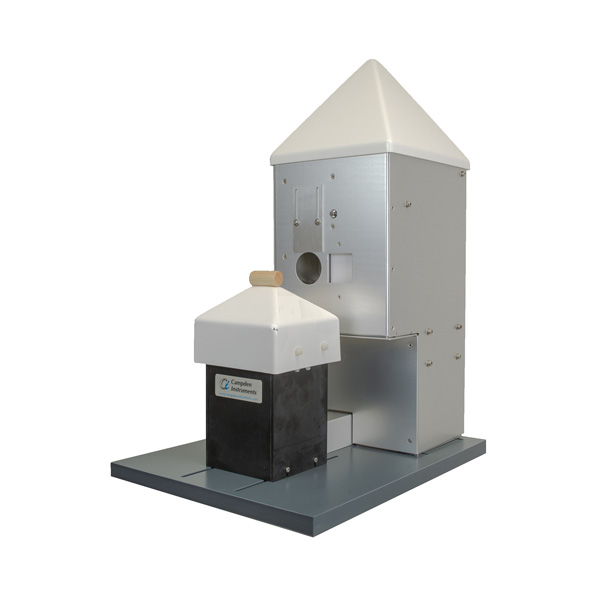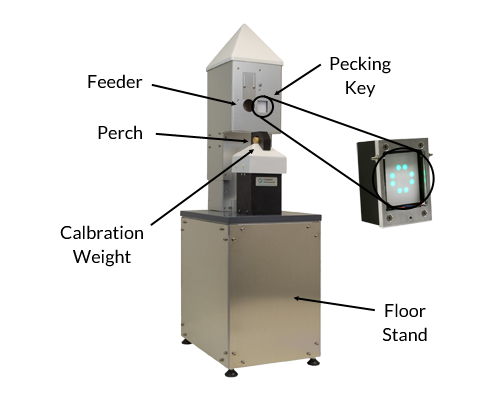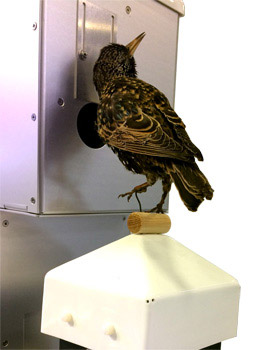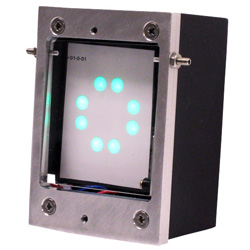
Avian Social Foraging and Cognition System
Model 80008
A system of programmable operant feeding stations that allows manipulation of food availability and collection of individual automated fine monitoring of weight and cognitive data from RFID-tagged birds housed in ecologically valid conditions.
A programmable operant feeding station that allows manipulation of food availability and collection of individual automated fine monitoring of weight and cognitive data from RFID-tagged birds housed in ecologically valid conditions.
The System
The system was displayed at the UWAF meeting, Newcastle upon Tyne, England. Visit the UFAW website for more information.
The system takes advantage of the Model 80130 Multi-Display Pecking Key. This pecking key can be used for pigeons, primates, or rodents. The response key is designed to trigger a durable (100,000 activation life) microswitch with as little as 0.6 mm of movement and 50 cN of force.
The Key boasts a sixteen LED array that can display any of 16 shapes in 8 different colors. The eight colors are: Orange, Red, Green, Yellow, Blue, Lilac, Turquoise, and White. The standard shapes are a cross, forward slash, back slash, square, circle, small dot, vertical bar, horizontal bar, and all on.


Intake Regulation
A large body of experimental literature has shown that foraging animals are sensitive not only to their mean rate of energy intake, but also to the variation in this rate. The question of how animals regulate their food intake and weight gain, both over the course of one day, and over longer periods is a phenomenon known as risk sensitivity, and has been the subject of intense theoretical interest by both behavioural ecologists and animal psychologists.
This regulation of intake may be affected by many environmental factors as well as by the mean and variance of the food supply on which they are foraging. The grainfeeder is solenoid operated and can be used with different seed and crumb rewards. A stimulus light indicates when the feeder is in the up position.
Campden's ASFC system allows continuous study of foraging and weight regulation in free-flying birds. It can also be used to present a full range of operant tasks without need for individual caging.
Features
- Multi-Station System with data from individuals of the flock
- No handling of free flying individuals
- Multi-display pecking key, 16 shapes, 8 colors
- Programmable operant schedules and ratios
- Automated fine monitoring of individual weights to +/- 1 g (max. 2kgs)
- R.F.I.D. antenna beneath perch
- Grain feeder and Stimulus light
- Perch height and distance adjustable
Specifications
- Height adjustment 100mm
- Perch lateral adjustment of 60mm
- Pecking key to hopper and key adjustment is 100mm maximum at higher elevation
- Perch at fixed height of 230mm above base.
Science
Case study on European Starlings from Newcastle University
Early-life adversity and interactions are an important predictor of adult obesity, to determine adult dietary cognition and body weight with a Progressive Ratio schedule as a measure of feeding motivation.
Hypothesis: Do the individual differences in dietary cognition mediate the observed relationship between early-life adversity and adult body weight with induced changes in physiology and dietary cognition, and with individual differences and interaction with the current environment of the adult bird cause differences in food intake rates and body weight?
Visit www.danielnettle.org.uk/starlings for more details on this study.
2021 References
Bateson M, Andrews C, Dunn J, Egger CBCM, Gray F, Mchugh M, Nettle D. 2021. Food insecurity increases energetic efficiency, not food consumption: an exploratory study in European starlings. PeerJ 9:e11541 http://doi.org/10.7717/peerj.11541

